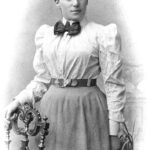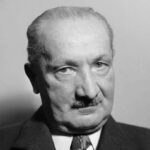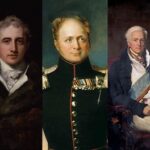August 20, 1639
Death of Martin Opitz in Danzig, Germany (now Poland). The poet and theoretician, Opitz, was a member of an important literary society of his times, the “Fruchtbringende Gesellschaft”. In his most important theoretical work Buch von der deutschen Poeterey (1624) he established standards for German poetry. For his contributions to poetic form he may well be considered the “father of German poetry”.
August 20, 1799
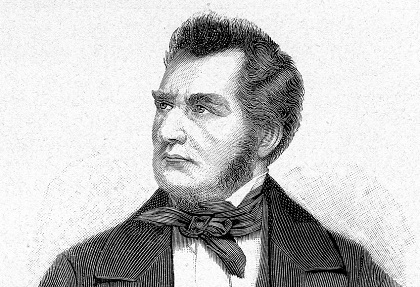 Birth of Heinrich Freiherr von Gagern in Bayreuth, Germany. Gagern was a patriotic advocate of German unification. He was influential in founding the Allgemeine Deutsche Burschenschaft, a student group seeking German unification. In 1848 he was elected president of the national assembly in Frankfurt.
Birth of Heinrich Freiherr von Gagern in Bayreuth, Germany. Gagern was a patriotic advocate of German unification. He was influential in founding the Allgemeine Deutsche Burschenschaft, a student group seeking German unification. In 1848 he was elected president of the national assembly in Frankfurt.
August 20, 1823
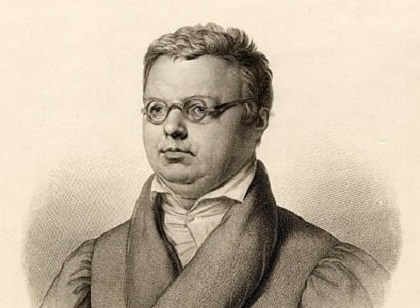 Death of Friedrich Arnold Brockhaus in Leipzig, Germany. Brockhaus bought a bankrupt lexicon in 1808 and expanded it into a full encyclopedia, Der große Brockhaus. In 1818 Brockhaus moved his operations to Leipzig where he published, in addition to his encyclopedia, a variety of other reference works, criticism, histories and biographies. After World War II the publishing company, which is still in family hands, was moved to Wiesbaden.
Death of Friedrich Arnold Brockhaus in Leipzig, Germany. Brockhaus bought a bankrupt lexicon in 1808 and expanded it into a full encyclopedia, Der große Brockhaus. In 1818 Brockhaus moved his operations to Leipzig where he published, in addition to his encyclopedia, a variety of other reference works, criticism, histories and biographies. After World War II the publishing company, which is still in family hands, was moved to Wiesbaden.
August 20, 1854
Death of Friedrich Schelling in Bad Ragaz, Switzerland. Schelling was a philosopher. In his formative years he was highly impressed with the ideas of Kant, Fichte and Spinoza. In 1798 he was appointed to a professorship at the University of Jena. Not long after his marriage to one of the leading intellectual women of the age, Caroline Schlegel, he accepted a professorship at the University of Würzburg. It was at about this time that his relationship with Friedrich Hegel, which had been close, began to deteriorate and grow into antagonism. In 1841 he was appointed to a professorship at the University of Berlin. While at Berlin he had contact with and began to influence the thinking of Friedrich Engels, Soren Kierkegaard and Jakob Burckhardt. Among Schelling’s important books are Über die Möglichkeit einer Form der Philosophie (1795), System des transzendentalen Idealismus (1800), and Philosophische Untersuchungen über das Wesen der menschlichen Freiheit (1809).
August 20, 1867
Death of Richard Rothe in Heidelberg, Germany. A student of Friedrich Hegel’s, Rothe became a professor at the University of Heidelberg in theology. An idealist, he proposed the view that the state would continue a process of perfection until such time that church and state would merge into one and the Christian state would replace the traditional church.
August 20, 1884
Birth of Rudolf Karl Bultmann in Wiefelstede, Germany. Bultmann was a New Testament scholar who sought to demythologize the New Testament. He was a professor at the University of Marburg. From 1922-1928 the philosopher, Martin Heidegger, was also at Marburg and had considerable influence on Bultmann’s thought.
August 20, 1886
Birth of Paul Tillich in Starzeddel, Germany. Tillich was a Protestant theologian who sought to integrate traditional Christianity and modern life. He was an early opponent to the Nazis. He was the first non-Jew to be barred from academic appointments in Germany. He immigrated to the U. S. and taught first in New York and then at the University of Chicago.
August 20, 1904
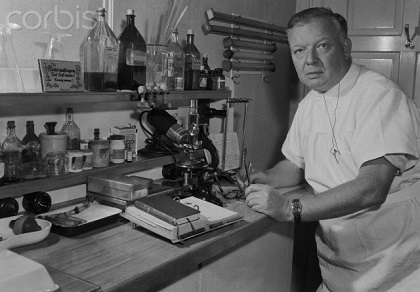 Birth of Werner Forssmann in Berlin, Germany. Forssmann won the Nobel Prize for Physiology or Medicine in 1956 for his development of cardiac catheterization. Frossmann was the chief of surgery at the Evangelical Hospital in Düsseldorf.
Birth of Werner Forssmann in Berlin, Germany. Forssmann won the Nobel Prize for Physiology or Medicine in 1956 for his development of cardiac catheterization. Frossmann was the chief of surgery at the Evangelical Hospital in Düsseldorf.
August 20, 1914
The fortifications at Liege, Belgium, having been attacked by German general Ludendorf on August 4, had collapsed on August 16. On August 20, the armies of German generals von Kluck and von Bulow occupy Brussels.
August 20, 1915
Death of Paul Ehrlich in Bad Homburg, Germany. Ehrlich was a German physician and scientist who worked in the fields of hematology, immunology, and chemotherapy. He invented the precursor technique to Gram staining bacteria, and the methods he developed for staining tissue made it possible to distinguish between different type of blood cells, which led to the capability to diagnose numerous blood diseases. His laboratory discovered Arsphenamine (Salvarsan), the first effective medicinal treatment for syphilis, thereby initiating and also naming the concept of chemotherapy. Ehrlich popularized the concept of a “magic bullet”. He also made a decisive contribution to the development of an antiserum to combat diphtheria and conceived a methodology for standardizing therapeutic serums. In 1908 he received a Nobel Prize in Physiology or Medicine for his contributions to immunology.
August 20, 1917
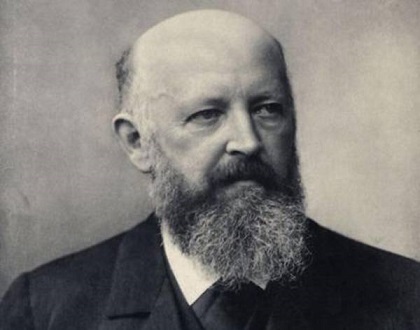 Death of Adolf von Baeyer in Starnberg, Germany. Baeyer was a chemist who synthesized indigo. He won a Nobel Prize for Chemistry in 1905. He succeeded Justus von Liebig in the chair of chemistry at the University of Munich in 1875. Among his many discoveries was barbituric acid, the generative compound of barbiturates. (He is not to be confused with Friedrich Bayer, the founder of the Bayer chemical company.)
Death of Adolf von Baeyer in Starnberg, Germany. Baeyer was a chemist who synthesized indigo. He won a Nobel Prize for Chemistry in 1905. He succeeded Justus von Liebig in the chair of chemistry at the University of Munich in 1875. Among his many discoveries was barbituric acid, the generative compound of barbiturates. (He is not to be confused with Friedrich Bayer, the founder of the Bayer chemical company.)
August 20, 1952
Death of Kurt Schumacher in Bonn, Germany. Schumacher was the first chairman of the Social Democratic Party after WWII. During the period 1933-1945 he was in concentration camps. When a German government was reestablished in 1949 he was elected to the parliament.

